You hear it everywhere these days: the term “gent” or “gentleman” has become ubiquitous in men’s magazines, blogs, and conversations. Videos welcome “gentlemen” and everybody seems to use the word for a wide range of men.
A reader recently took us to task by saying that anything other than the traditional definition of a gentleman is a disappointment. Another claimed that a gentleman must have staff and would never cook for himself.
We couldn’t disagree more – the definition of a gentleman has changed and for the better. Prince Phillip, a textbook “gentleman” of wealth and position, is also famous for his potty mouth and racist gaffes. Are these gentlemanly behaviors? Certainly not.
Since the definition of a gentleman is so fundamental to what the Gentleman’s Gazette is, we thought it was time to outline how we see the gentleman today.
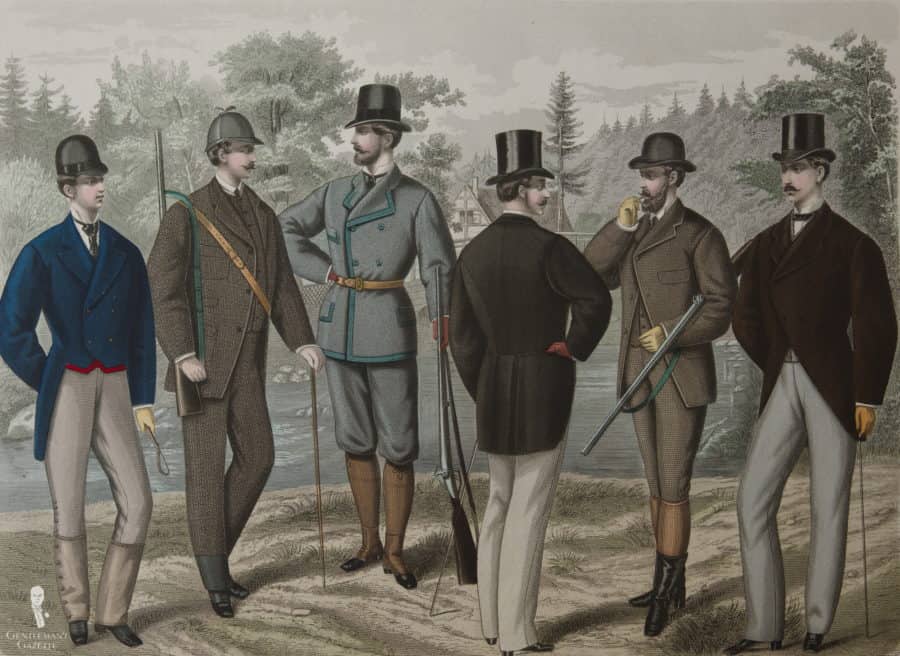
The Original Gentleman
A hundred years ago, a gentleman was a man of high social position and wealth. Even today dictionaries still retain this definition, as well as several others:
- A chivalrous, courteous, or honorable man.
- A polite or formal way of referring to a man.
- A man of noble birth attached to a royal household
- A man of good social position, especially one of wealth and leisure
- A courteous title for a male fellow member of the House of Commons or the House of Representatives
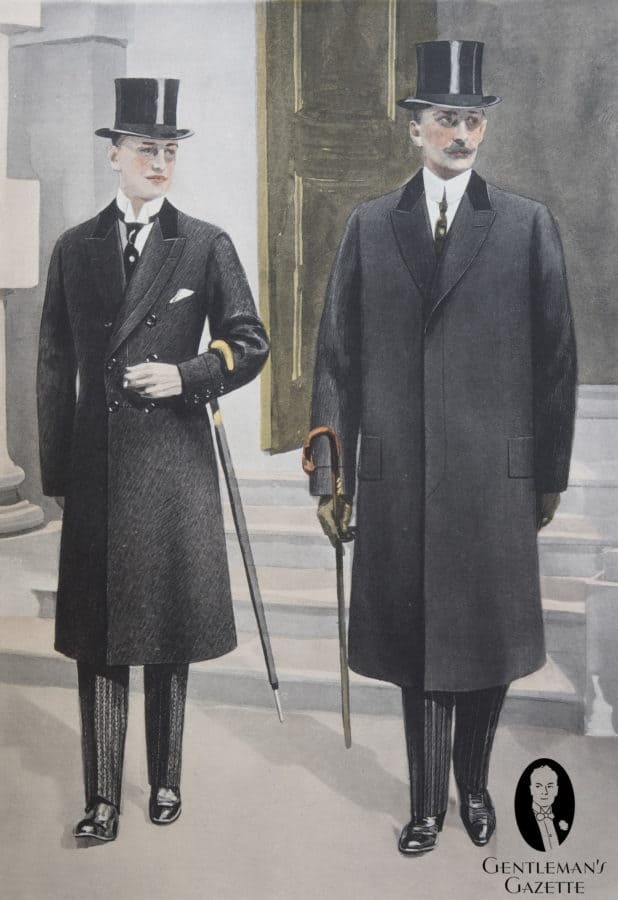
So what does it really mean? There is much more to being a gentleman than mere courtesy; traditional acts of chivalry can come off as condescending, and “honor” is a highly relative concept.
These days, the title “gentleman” is no longer relevant as an indication of one’s refinement and character, as it was once assumed to be for men of wealth and title who didn’t have to work for a living.
In our opinion, the term is far more egalitarian, and these days, to say you are a gentleman means you have to earn it. Wealth and power are no longer enough, and in fact, they simply aren’t a relevant part of the modern definition. Money and position can’t buy you class or respect.
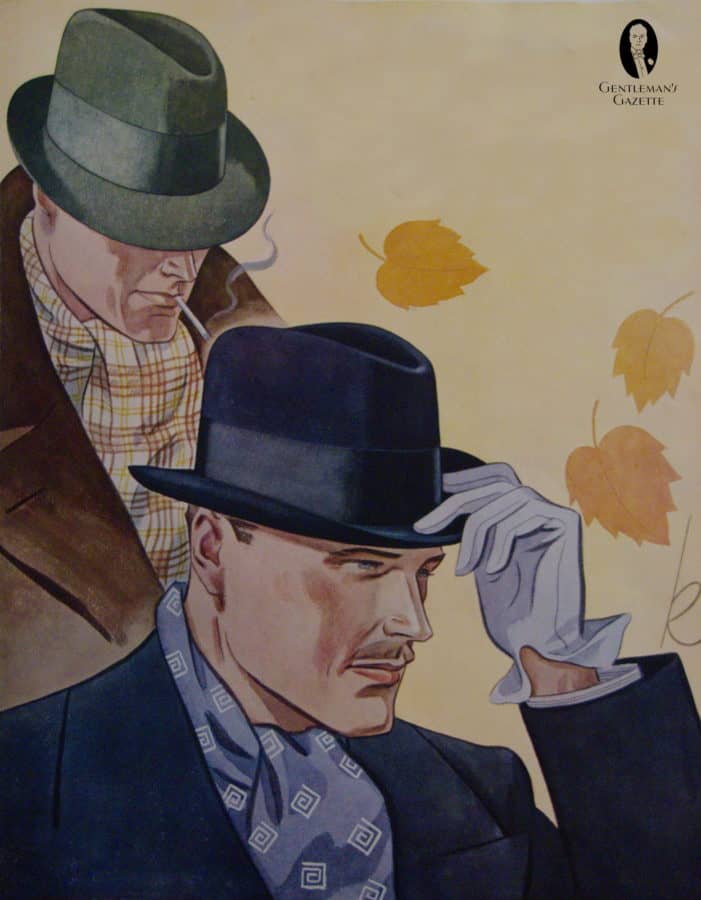
The Definition of a Modern Gentleman
The term is far more complicated, and we think it’s important to shed some light on why and how we use it, and why the definition of the modern gentleman matters.
We firmly believe any man can be a gentleman if he wants to be, but it’s not a small undertaking. It’s a journey, something that a man continually strives to be, rather than a destination. A gentleman is:

- A Gentleman is Imperfect. This may be the most important characteristic on the list. The term “gentleman” isn’t meant to be an unattainable ideal; it takes into account basic human nature, in which we all make mistakes, choices, and judgments every day. The difference lies in that a gentleman does not believe himself to be perfect, but instead takes ownership and responsibility for the things he can control: his actions, knowledge, and approach to the world.
- A Gentleman Has High Standards. High standards push people to do the best they can, and gentlemen set them for themselves. A gentleman expects a high standard of quality, value, and functionality from the things he buys to the things he does. He expects as much of himself as he does of other people.
- A Gentleman is Well Dressed: This one shouldn’t be a surprise. A well-dressed man is appropriately attired based on the season, the occasion, and his own style. Dressing well isn’t a matter of money for a gentleman, but rather of careful curation of clothing and accessories based on his means, the occasion, and his tastes. His dress demonstrates that he recognizes the power of clothes the impression they make, and the role they play in society. Clothes are used to convey a gentleman’s respect for his host, his office, or for the host of an event, but not to shock, evoke jealousy, or show off. Dressing well is a point of pride for a gentleman because it demonstrates his personality and taste.
- A Gentleman Has Good Manners: Here, we agree with the dictionary. A gentleman is courteous, polite, and respectful. He says please and thank you, waits his turn in line, and treats others as they wish to be treated. He is an equitable conversation partner and displays good table manners and dining etiquette.
- A Gentleman is Open Minded: A gentleman does not believe that his opinions and knowledge are complete and unquestionable. He strives to learn, is open to new ideas, accepts constructive criticism, and welcomes failure as a path to growth and self-awareness. A gentleman does not argue purely for the pleasure of being right but focuses on is able to put himself in other people’s shoes for the purposes of understanding an alternate perspective from his own.
- A Gentleman is Interesting and Informed: These days it is easy to get lost in the cycle of sleep-work-netflix-repeat that deprives people of anything interesting to say. An interesting man can successfully carry a conversation about a number of subjects, is interested in the world around him and how it works, and actively seeks to grow his knowledge for his own character building and enjoyment. Hobbies and personal interests reveal his passions and his engagement with activities that are meaningful to him.
- A Gentleman’s Actions Match His Words. Quite simply, a gentleman makes promises that he intends to keep.
- A Gentleman Treats People with Respect: When we say people, we mean everyone – women, colleagues, superiors, waitstaff and customer service people. This reflects a gentleman’s belief that all people are created equal; he does not claim to have more or fewer rights than those around him. He is compassionate with those less fortunate than himself. He doesn’t believe that the world is a zero-sum game, nor does he believe that putting someone else down will lift him up.
- A Gentleman Recognizes the Difference Between Arrogance and Confidence. If an arrogant man who believes himself to be of superior importance relies on his opinion of himself relative to others. A gentleman believes in himself and his abilities independently of other people. An arrogant man must always win to feel validated while a gentleman self-validates from within.
- A Gentleman Wields Power Purposefully. Though there are many potential sources for the statement “with great power comes great responsibility,” there is an inherent truth in it for a gentleman. If he is in a position of power, he combines all of the above traits to utilize that power purposefully and not selfishly. Not for revenge, not for his own personal gain, and not in a way that tramples the rights of others.
- A Gentleman Gives People the Benefit of the Doubt. Even though it can be a challenge to avoid cynicism in a tough world, a gentleman chooses to give people the benefit of the doubt. The person who cut you off on the highway may have received bad news; a friend may not respond to your call because they are behind at work – a gentleman tries not to jump to negative conclusions about other people.
So why does this all matter? It matters because being a gentleman sets a high bar for men, us included, to actively work towards every day. Rather than being a destination, it’s an aspiration that comes from the lifetime pursuit of personal betterment, self-awareness, and motivation.
The highest achievement is to be recognized as a gentleman by those around you, since at it’s core it is an honor conferred only by other people. We use the term gentleman frequently, and we think it should mean something. It’s not just a way to address other men; it’s a statement about who we are and who we want to be.
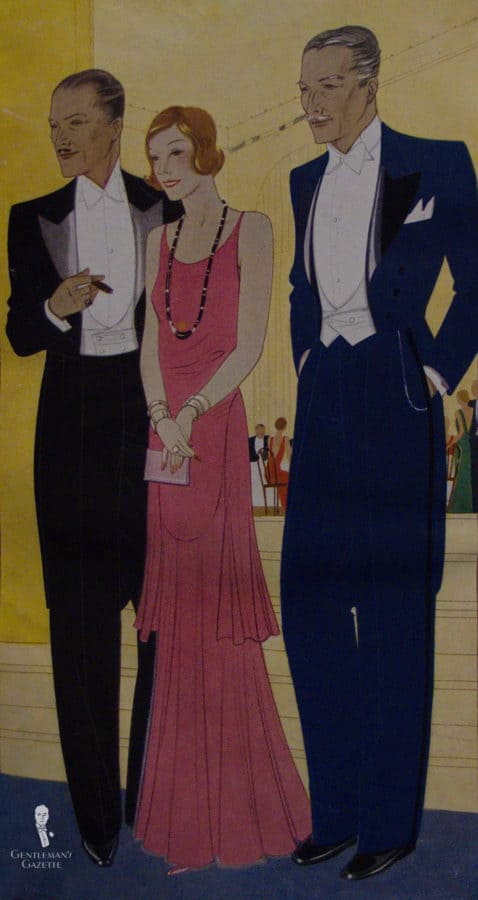
The Challenges of Being a Gentleman in Everyday Life
While all of this sounds admirable, living up to those ideals day in and day out can become quite challenging at times. When a man is in a bad mood, stressed or tired, he may say or do things that are out of character. In those situations it is important to apologize to others and if it is sincere people will accept it. I know what I am talking about because I certainly had my fair share of ungentlemanly failures.
My personal daily, gentlemanly struggle occurs with emails, article comments, and YouTube comments. I started the Gentleman’s Gazette because I wanted to share my passion for classic style to help men dress better through better information. At first, I eagerly replied to every email, comment or request personally like a gentleman would. Over time, more and more people found the way to our site, and it is no longer possible to reply to every comment and email personally. Of course, sometimes they are upset with us if we do not spend the time on them they think a gentleman would. In those cases, it feels very difficult not to reply because I want to, but without that discipline, it’s impossible to keep the Gentleman’s Gazette producing the articles, videos, products and emails that everyone enjoys. That aside, I try to give people the benefit of the doubt that they would understand if they knew.
What are your challenges of gentlemanly behavior in everyday life? Please share with us in the comments.
Should a gentleman engage in vices?
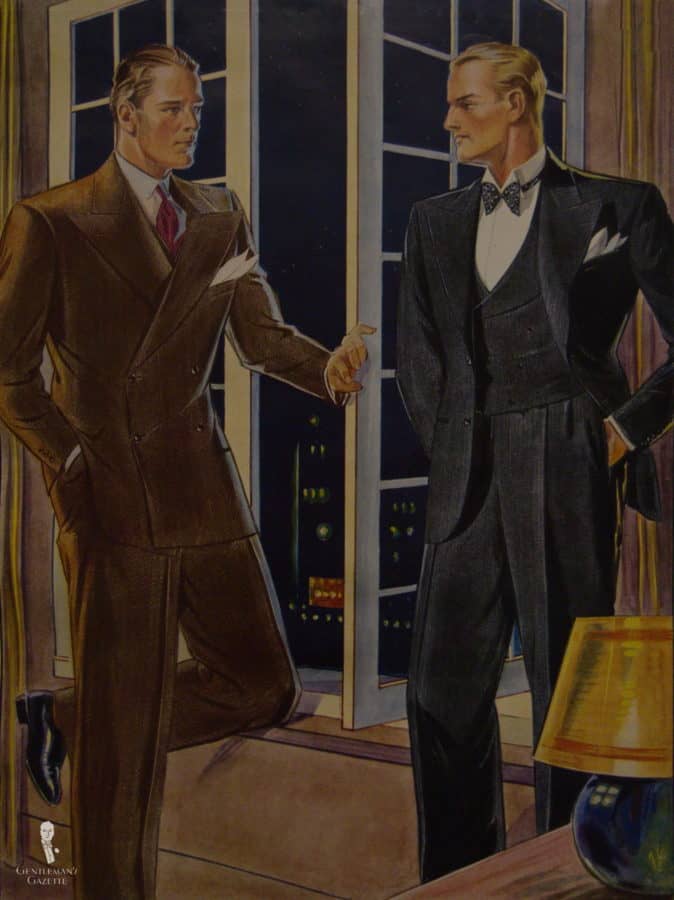
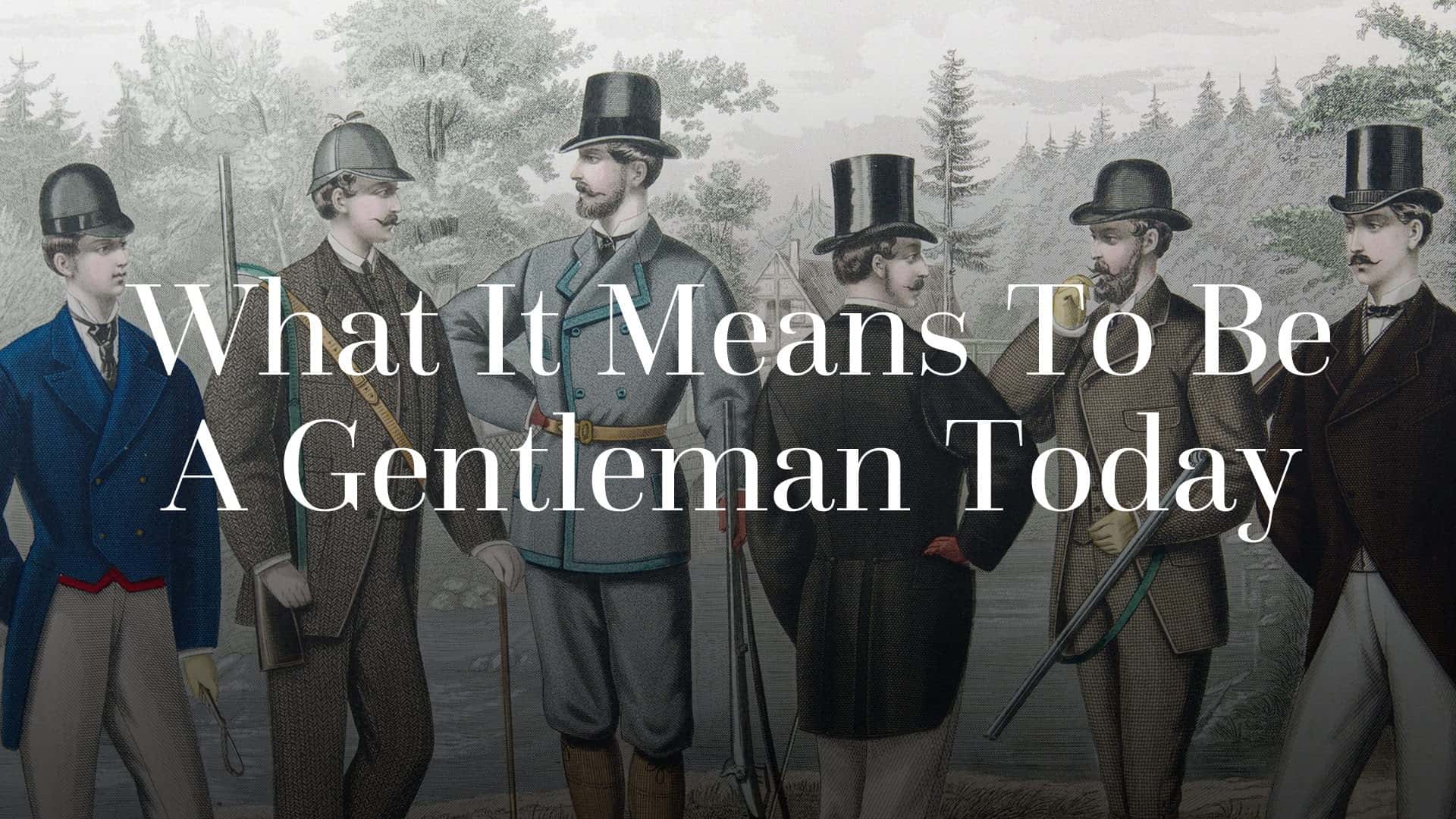

Thank you for this good and helpful article on being a gentleman today! I wish more of us would aspire to be such – for today’s world surely need gentlemen as you define the term.
I appreciate as well your core vision and aims. Keep up the good work!
Thank you, Gavin. I couldn’t agree with you more.
Good article……….. however, a gentleman is just that………. ‘gentle’ because he does not ‘work’ or any ‘work’ that he does do would be possibly be looking at his investments………. further………. a gentleman is someone who is at ease in any situation and always puts others at their ease, too.
Jonty,A Gentleman can and does work.He can earn millions,or just have enough for the next meal.
In the words of Downton Abbey’s O’Brien, “real gentlemen don’t work…”
Maybe on a TV show or in the archaic view of the definition; but a gentleman that won’t work is just a lazy man.
Not quite. Gentle refers to belonging to a “gens” which is the Latin term for what the Scots may call a “clan” for example. For this reason, especially in The Continent the status of gentleman is associated with the “GENitive particle” which in Romance languages is “de” and the German “von” etc. It means one belongs to a gens or is issue from one. In the Roman empire, for example, Caesar was of the Julii (Gens Julia) and was technically a “gentleman” for this reason. As such, any member of the Spencers, Windsors, Bourbons, or Marlboroughs is a gentleman, however cadet they are from the branch with the titles. The rule is that if you descend from a noble person… you are a gentleman… by extension, a noble (albeit minor) yourself. You may be penniless, work, or live off of the charity of your wealthier relations – but your state, as “gentle born” is not in jeopardy whatever your actions or behavior, office or fortunes. Because normally, people born in the Gentry had access to education, and generally had certain military and political offices reserved for their class in the various monarchies of Europe, the said status became associated with good manners and “savoir faire”. After all, if you were accustomed to see royalty dine in the country estate of your grandparents or relations – odds are you would know how to sip your tea or cut your meat if ever invited to the palace. With the American experiment, most (if not all) of the “Gentlemen” who signed the declaration of Independence and formed the early Senate and House of Representatives, were indeed gents in the state they ceded from (England). And quite a few of them had coats of arms too. Washington was related to the Spencers, a gens, family or clan that also gave us Sir Winston Churchill and now the Duke of Cambridge and Prince George (heirs to the British and Canadian thrones amongst others). Also, the use of the term to this day in The Capitol is supposed to democratize that noble office which in the monarchies once was reserved for a certain elite – restricted to circumstances of birth and class – opening the ranks of the Senate and Congress to any and all American citizens whether born a gentleman or not. It was an egalitarian stand, as the “we are all created equal” notion (though sadly, they did not consider that other lot of Americans with darker shades of skin as people and much less as citizens… but that is best left for another conversation…) In the room, they looked at each other and though some were the traditional “landed gentry” and others were publishers and lawyers – saw only gentlemen among them. After all… the time was called the enlightenment! (There just was no electricity quite yet). Incidentally, that “Esq.” behind a lawyer’s name is actually indicative that at some point, someone decided that it was a noble profession – one that entitled he who passed the bar to be treated as a gentleman (meaning, to have a coat of arms, as the descendants of a noble even if you did not descend from a noble…) and as a Scutarius (Esquire -> Esq.) which means “shield-bearer” you could transmit to your descendant this state. In France this was called the “noblesse de plume” as opposed to the “noblesse d’epee” which was the traditional warrior class. In any case, all that is described in the article is indeed characteristic of a true gentleman – and more people SHOULD act as gentlemen even when they are not (yet) – for if they practice enough, perhaps they do become. In other places it requires a monarch to recognize nobility – in places like the US one assumes it, and if others recognize it (The People recognize it) then no one shall dispute it. President Kennedy and his brothers, son and nephews were all gentlemen in a traditional sense, but Carter, Bush, Obama (whatever one’s political views may be) are or became gentlemen along the way. Would anyone doubt the inherent gentle state of Madeleine Albright, Maia Angelou, George Clooney or Dr. King? Charlie Rose? Yet many do not act as gentlemen and gentlewomen – sometimes even those who to the manor were born. Being is not enough – but living up to the axioms of it, as listed in the article above, certainly helps the world be a better place. Cheers!
Isn’t the article about what a gentleman is TODAY… not 150 years ago?
We intentionally did not want to use pictures of living men and chose to go with vintage illustrations.
My comment was not about the pictures. No problem with the old pics.
It was a response to Edward’s comment above. Cheers!
I agree with others. One can be a gentleman and still work. To be a gentleman has to do with the essence of their character, not their bank account.
Absolutely agree…
Appreciate the article. Splendid. After having lived in big cities in my younger days and my work required a coat and tie. It has been somewhat difficult to continue to have the style I like. However, I found that when I did dress as preferred, I was rewarded with compliments. One thing I learned early on is if you wear a tie, you maintain the gentlemanly air. Where I live, dressing up means putting on clean jeans. I am now at the age I wear what I want, when I want without regards to what they think. I am comfortable in my own skin. Thank you for your website and posts.
In the U.K. and particularly England, money has little or nothing to do with being a gentleman. It is, now, a state of mind and ambition to achieve. Whilst the Monarch can make a Peer, only God can make a gentlemen !
Thank you very much for this article and for undertaking the ever more important task of spelling out these points. I like that you emphasized the transition of the historic notion of a gentleman to what he is supposed to represent in the modern world. Perhaps I am mistaken, but these days in a society, like the USA, little or no effort is made by the education system, both formal and informal, to teach these principles together as a package of characteristics of a person. Instead, the population at large believes that differentiation on the basis of the list of these qualities is somehow elitist, and so the term “gentleman” is applied indiscriminately to all men and its true intended meaning becomes blurred. Yet, some who bother to dig up the dictionary (traditional) definition of the term that you presented in the beginning of this piece, simply rely on it to discredit the use of term to denote such characteristics, since they don’t fit with the paradigm of the modern world. In updating the code of a gentleman to the modern times may bring revival of the motivation in many men to self-improve and strive for the better in themselves, thus benefiting the world around them, and being distinguished for it.
A very nice essay…and so typical of the fine work we all see in the postings on G.G.. It’s important to remember also that a gentleman is naturally so…nothing is ever forced or contrived with a gentleman. He is first and foremost comfortable and quietly confident in his own skin. He exudes the qualities that naturally embody the concept.
Well said sir. I love reading and learning from your gazette.
Thank you for your support!
excellent article!
Very good article. So very needed today. Too often people gravitate to the lowest common denominator. Those of us who would aspire to be gentlemen must always remember that it is not about us. It is about striving to provide an example to others worthy of following. It is a lifelong commitment to leave the world a bit better than we found it.
Good article, loved the discussion and traits of a gentleman. Really needs a broader distribution in today’s society. One thing struck me though, the pictures you used. There was no doubt these images were of gentlemen, even the smokers had an air of class about them. So now, would, or even could you find, pictures of the today’s men that would instinctively say this is a gentleman? I’m not sure. There just is something gentlemanly about the classic image. There was the Rat Pack, but, that was still over 50 years ago. Again, a very nice and informative article.
Excellent article, and I quite agree – noble conduct can be learned, but the title must be earned. No one is a gentleman by nature, and claiming the honor would be like asking for a Knight’s Cross…!
In my opinion, a gentleman should have a sense of understanding when to interfere with matters, that are (strictly speaking) none of his concern. When is it appropriate, welcome or maybe even required? Of course it’s a matter of personal judgment in a given situation, but making it can be a challenge of gentlemanly behavior in everyday life.
I have very much enjoyed this article and it reminds me to always strive to improve myself and have tolerance and courtesy with people I meet on a daily basis.
Thank you very much for the article about what it takes to be a gentleman today. As flawed human beings, it is always good to receive periodic reminders to help us become better individuals, so thanks for the reminder. In my personal effort to be a gentleman, I consciously try on a daily basis to do at least one good deed for someone else, while at the same time trying to incorporate the characteristics you mentioned in the article. I’ve found it gives me great pleasure in doing so and helps to reinforce other gentlemanly behavior.
That sounds wonderful. Thanks for sharing, Bill.
Very good article, I think the modern gentleman must treat people as a equal doesn’t matter which position they are, respect and honesty never will be out fashion and of course well dressed for any occasion.
Enlightening article. As you indicated, the definition of a gentleman historically had to do with nobility of birth, thus making it a rather exclusive club. I prefer the modern definition which emphasizes nobility of character, something that any man can aspire to, regardless of where he was born.
It is more difficult to be a gentleman in these times. Our politicians, who should know better, show no gentlemanly behavior. The youth of today see genteel behavior as a weakness and so the number of people who understand and practice this essential social art are dwindling. More and more I find my civility being strained to near limits.
My biggest pet peeve is the oxymoronic “social” network. Young people sitting next to each other and staring intently at little screens. This can go on for hours! Not a word spoken, acknowledging no one else…..This deeply saddens me.
Thank you for an interesting and informative article. I think it very accurately captures the essence of what constitutes gentlemanly behaviour in the 21st century.
An imperfect man can aspire to be a perfect Gentleman ,
You can lump it in, I guess, with some of the other categories, but a key area for being a gentleman in my view is that a gentleman is moral, not taking advantage of others, being honest, and yes, being chaste. The Scout motto is really a good start there. And the challenges? Well, there ya go. Good clothes are easy–my family raised me to understand some of the importance of quality, color, fit and all that really well–but the moral characteristics are a tougher deal.
First and foremost, I believe a “Gentleman” earns that recognition when in all his encounters with other people, he makes them feel, as important or more important than himself. The other attributes which you outlined follow.
The number of respondents addressing your wonderful subject is very gratifying too!
Dear Sven
I fully agree with everything you have written here and also (especially) with the post by Dudley.
I have tried most of my life to behave in a gentelmanly way, I do not always succeed but I always try. At age 66 it appears that I may be improving!
I could not agree with you more ; this article is why I subscribe to Gentleman’s Gazette. Well done , my friend.
I really enjoyed the article and made note of your up to date views of what makes a gentleman and I agree. There was a time when boys on their way to becoming a man were taught the characteristics of being a gentlemen. In these new times a father who strives to be a gentleman should bestow these ways upon his sons at an early age by setting that example; thereby as the son wades through the harshness of becoming a man may he have that foundation.
I really enjoyed this article. I agree with every word. It’s also nice to see that this website also deals with the behaviour of a gentleman and not just how he should look. Being a gentleman is attainable by any man regardless of circumstance. Thank you for this up lifting piece.
Very good article. My concern is that we always speak of HOW to be a gentleman but we never speak of the WHY. How is the easy part. We can mimic the styles and manners of others. Why? Why be a gentleman? It is the strength of our why that determines whether we will stick with something or just be along for the ride until the next cool thing comes along. To have a burning WHY and to be able to articulate it is one of the hallmarks of a true gentleman.
I think the ‘why’ is, rather, self-evident … to be the best men we can be.
Sven,
Kudos to you on is piece. It is good to know that you and others think and practice those ways in which daily we can try to make our surroundings more civilized. your piece is, indeed, the other bookend to Peter Mayles pierce years ago entitled “The New Gentleman”. Jim
Bravo, Sven, for what is likely the most important of your very fine articles. Kudos also to your respondents Al, Richard Lawson and Jim Hunter above for so succinctly articulating what makes your piece so outstanding.
Another great post.
I’m not sure you can boil down “being a gentleman” to 11 rules.
Was Albert Einstein a gentleman? He didn’t conform to the “well dressed” rule.
Was Sir Winston Churchill a gentleman? He often didn’t have good manners.
The rules are helpful but I look at it like ths: if you dropped dead tomorrow would the people at your funeral say “he was a good chap, a real gentleman”?
If you are the kind of person that others would describe as a gentleman, then you probably are.
A wonderful article. Thank you so much.
Sven. Great job of defining a gentleman. Very balanced with an emphasis on the achievability of gentlemanliness. Keep up the good work.
About the 1913 drawing of two gentlemen in frock coats: I believe the gentleman on the right is actually wearing an overcoat, while the one on the left has a frock coat but possibly an overcoat instead.
Fun subject.
The gentleman, as it was known till recently, is not a dying breed, but an already dead one. Dead and buried, unfortunately.
The wealth aspect got removed because people became much more equal in things they could afford. For example, in the 60’s every man could afford a proper hat and had the time to actually wear it, but a hundred years ago the jobs were pretty much physical and you were forced to dress for the part. Now hats are mostly seen as extravagant, of course.
Manners were only taught to those who needed them, and those were the rich and blue bloods.
These days… I’m sure many men have the potential, but society doesn’t need them anymore. If you open the door for a lady, you might get a swearing for thank you.
Also, the high stress life we live makes it almost impossible for men to have time to think much about others. If one gets home from work after 10 hours of his boss yelling at him, it’s not easy to still gather the energy to act like a gentleman with people around you.
I imagine life in the past as being much more relaxed. And being a gentleman was sometimes a society requirement, a job in itself.
Well, as a woman, I thought it was a great article. Let me tell you how challenging it is to find a gentleman in the dating world. Now by gentlemen, I’m referring to a man who acts with class, and respect and even though he might think something sexual he doesn’t actually voice it. In my opinion, this is where guys need help the most. Some of the nicest guys will ruin it in the first five minutes of a conversation with their language. They think that being a gentleman only has to do with chivalry, and that’s just so not true. For some reason men think it’s completely OK to use whorehouse language in a first conversation with the lady. I’m begging you, could you please do some kind of an article to teach these guys proper respect and some gentleman etiquette for the dating world??!! Thank you!!